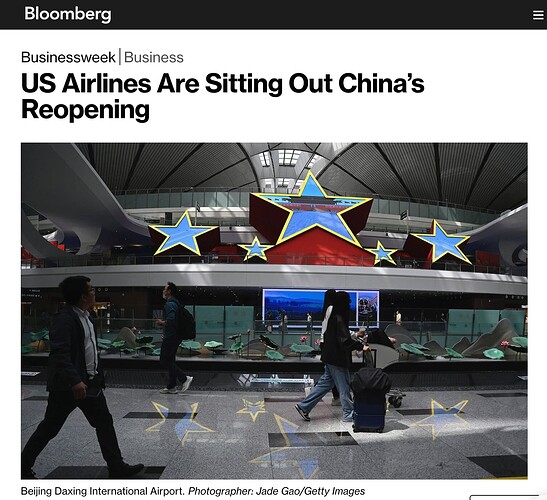中国在因Covid-19而自我隔离三年后重新开放,但美国的航空公司并没有恢复两国间曾经丰富的服务。大流行之前,美国和中国之间的直飞航班平均每周340次,而今天每周只有二十几次。美国最大的航空公司–美航、达美和美联航–将在大流行时期的水平上继续飞行,不是因为需求疲软,而是因为对俄罗斯空域限制的争议。
美中关系已经恶化,为快速外交解决的前景蒙上了阴影。日本的全日空控股公司、IAG SA的英国航空公司、阿联酋航空公司和大韩航空公司都已经重启或宣布计划恢复到中国城市的每日航班。法国航空公司正在要求法国政府限制中国航空公司进入该国,并要求将其自己的中国方向的航班增加一倍以上,达到每周14班。
美国航空公司正在推动拜登政府阻止中国竞争对手使用俄罗斯领空,因为这为他们提供了更低的燃料成本和票价以及更短的飞行时间的优势。并非所有设在中国的航空公司都能像美国航空公司那样提供同样水平的服务和美国连接,美国航空公司声称这种航线劣势使三大航空公司每年损失20亿美元。
中国的航空公司,其中许多是国有的,没有什么动力去妥协,而且地缘政治的复杂性也可能证明是一个挑战。拜登政府有更重要的问题需要关注,而且中国人同意禁止使用俄罗斯领空的可能性是 “零”。两国间不断增长的航班需求意味着除非达成某种协议,否则钱将被留在桌子上。
美国航空公司首席执行官罗伯特-伊索姆(Robert Isom)表示,他希望通过外交途径解决问题,美国航空公司没有对总部设在印度和中东、也使用俄罗斯空域的航空公司寻求同样的制裁。如果能够达成协议,航空公司将希望增加运力,美联航计划在今年晚些时候将每周飞往澳大利亚和新西兰的航班增加40%。
在大流行之前,中国和美国之间的航班由两国签署的航空服务条约进行监管。实施制裁往往会导致 "以牙还牙 "的反应,可能会产生意想不到的后果,把经济问题当作经济问题来对待是比较明智的。
China is reopening after three years of self-imposed isolation because of Covid‑19, but US airlines are not reinstating the once-abundant services between the two countries. Pre-pandemic, direct flights between the US and China averaged 340 per week, and today there are only two dozen weekly. The biggest US airlines—American, Delta and United—will keep flying at reduced pandemic-era levels, not because of weak demand, but due to a dispute over Russian airspace restrictions.
The US-China relationship has deteriorated, clouding prospects for a quick diplomatic resolution. Japan’s ANA Holdings Inc., IAG SA’s British Airways, Emirates Airlines, and Korean Air have all either restarted or announced plans to resume daily flights to Chinese cities. Air France is asking the French government to limit Chinese airlines’ access to the country, and is also asking to more than double its own China-bound flights to 14 a week.
US airlines are pushing the Biden administration to block Chinese competitors from using Russian airspace, as it provides them an advantage in lower fuel costs and fares, as well as shorter flight times. Not all carriers based in China offer the same levels of service and US connections as American airlines do, and US airlines claim this route disadvantage has cost the Big Three $2 billion annually.
Chinese airlines, many of which are state-owned, have little incentive to compromise, and geopolitical complexity may also prove a challenge. The Biden administration has more important issues to focus on, and there is “zero chance” the Chinese would agree to a ban on using Russian airspace. Growing demand for flights between the two countries means money will be left on the table unless some sort of accord is reached.
American Airlines CEO Robert Isom has said he’s hopeful for a diplomatic resolution, and US airlines have not sought the same sanctions for carriers based in India and the Middle East that also use Russian airspace. If an accord can be reached, airlines would like to add capacity, with United planning to increase weekly flights to Australia and New Zealand by 40% later this year.
Flights between China and the US were regulated before the pandemic by an air service treaty signed by the two nations. Imposing sanctions often results in a “tit-for-tat” response that could have unintended consequences, and it is wiser to treat economic problems as economic problems.
https://www.bloomberg.com/news/articles/2023-05-10/us-airlines-are-sitting-out-china-s-reopening
